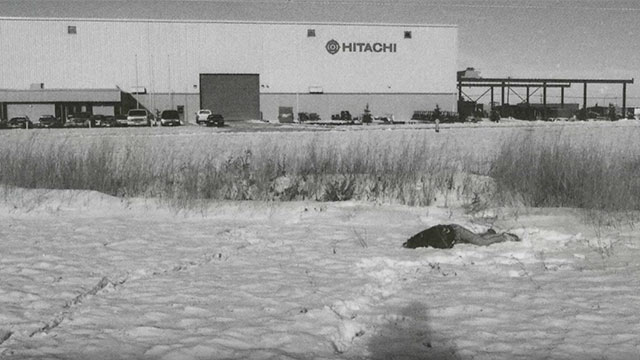
I remember driving home from our grandparents’ house in the early dark of Winter evening, passing over gravel hills, frozen fields to the left and right of us, I didn’t know that this should all have been a forest. My younger brother and I in the middle seat, counting all the houses shining in the night with Christmas lights. Red, yellow, green, and white. Haloes of colour, signals of warmth, in a void that was dark and c-c-c-c-cold enough to freeze any Indigenous teen grabbed by the cops and ditched outside of town without shoes or coats or hats or mitts or scarves or snow-pants and all the other things we bundled on then, when we were children, and I tried to fall asleep, hoping that my mom or dad would carry me still half-sleeping (or more than that) from the van into our house when we got home.
Neil Stonechild was only seventeen when he froze to death northwest of Saskatoon one Winter night when the temperatures had dropped to -30 or so (Celsius—that’s -22 Fahrenheit). Bashed in nose, cuff marks on his wrists, and one shoe missing altogether (the Saskatoon Police, who dropped him there, did an investigation into his death and concluded there was no foul play). That night, the sky was clear and full of stars, although, given their distance from us, no matter how fast light travels and how long stars live, a lot of them are already dead. Their deaths just haven’t caught up with us yet. Dead stars shining down on a dead boy whose life, however brief, was also composed from stardust and whose death, I sometimes think, has also not caught up with us yet. November 25th, 1990. I was ten years old. I may have been looking at the same stars on a sleepy car ride home.
And Winters come and go, just like the rest of us, and these days I don’t count houses with Christmas lights, I just try not to count those whom I love and who loved me, too, who died around this time. I could never bring myself to count the dead—those I know who died in shelters, or on the steps of shelters that kicked them out; those who died in public washrooms hoping to please, God, for just a few minutes, feel okay; those who died when the hospital disconnected them from heart-and-lung machines after fruitlessly searching for family or next of him; those who bled out on the sidewalks of cities (that also should have been forests); those who jumped in front of trains; those who were seeking a little warmth, a little safety, a little privacy behind a garbage dumpster; those who died of blood infections after being kicked out of hospital; those who just couldn’t take one more punch to the head; those who only needed a door handle and a belt to hang themselves; those who simply disappeared, vanished, were gone, erased, voided, missing. I could never number them. They are too important to me. They won’t allow that. And I don’t want it, either.
And the biggest lie about Christmas is that there’s a god who will come and save us. And the sickest joke about Christmas is that all these rich Christians pretend like they’re longing for salvation but, really, they know that god has ever only been on their side as they look on children never stolen from them, in homes never invaded by the Children’s Aid Society, social workers, cops, bed bugs, drunken violent neighbours who push their way in, or slumlords who like to sniff around, and they pretend they are longing for god to come but, really, they’re thinking, “not this year—this year I think I want an iPhone 11, that bathroom renovation I’ve been putting off, and maybe a trip to Bhutan.” Because they sing, “O come, O come, Emmanuel,” but they’re faking it—wallowing in a passion play that involves them pretending to feel lost so that they can pretend to feel saved—because already they have all they need (including the judges, security guards, politicians, bankers, and whatever number of pussies they want to grab).
And me? I bought my children seeds to celebrate the start of the holidays. In the Spring, they will each be able to grow a flower garden. Until then, when we’re out driving in the dark, I see the way the houses with lights—all red and yellow and green and white—reflect in their eyes, and I see the special excitement that flushes across their quiet features as they nestle down in their seats and Ruby pretends to fall asleep so that I will carry her inside.